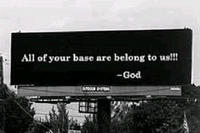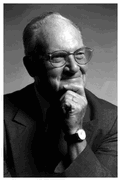| Friday, March 14, 2003 |
| Structure or Not? |
 Yesterday I commented favorably on Seb's Towards structured blogging. Euan Semple has a contrasting view: Yesterday I commented favorably on Seb's Towards structured blogging. Euan Semple has a contrasting view:"Hey great - then we can all get a taxonomy for the world and we can all argue about which words are more "right" than others, then one group can be more "right" more of the time and can start to dominate and then we can all rest happy that we all agree.And now Roland Tanglao says: "I think both views are correct. We need structured and unstructured blogging that we can "just" link to."And, well, I agree with everybody. We need both structure and freedom from structure. What I like about weblogging is exactly that I can just post whatever is on my mind, and I don't have to figure out where it "belongs" or what its proper place is in the taxonomy of all knowledge in the world. I just post it, and the weblogging software keeps a certain minimal structure, which makes it relatively easy to find again, and easy for others to link to. What makes weblogging such a booming phenomenon is exactly that I'm freed from thinking about structure, and I can just concentrate on what to say. And I can freely comment on what others say, without worrying much about whether it fits in or not. But the other side of the coin is that when I'm looking for something, I'd really prefer if ALL information in existence were neatly organized and categorized and cross indexed in any possible way I can think of desiring. I would LIKE to be able to access all movie reviews in the world, and ask for them to be sorted by the reviewer's age or something, and filtering out people who's views I know I don't share. So, that's a bit of a puzzle. I don't really want to have to make a lot of finegrained choices when I post. But I'd like them to be available when I search. Earlier I talked about the same problem, and I half-heartedly concluded that I'd prefer if some AI program was following me around, neatly organizing everything that happens to me. I just don't see that happening any time soon, as I'm not sure I believe anybody knows how to do good AI. The best suggestion I have in the interrim is to come up with a scheme where structure can be added, not just by the author, but by casual readers, and/or by automated programs. Example: I often post references to books. Ideally those references should be recognizable as book references, even by automatic programs. That could happen if we all agreed on a certain XML tag I would use whenever I mention a book. But that would be a hassle if there were thousands of things we might want to flag that way. Movies, people, places, organization, etc. Most authors wouldn't bother doing that extra step. So, for one thing, if I predominantly linked to amazon.com whenever I mentioned a book, a program could easily figure that out. Or, if there is a way for my readers to add structure. Some people will naturally be obsessed with categorization and structure. If a few hundred people read each of my postings, it is quite likely that at least a couple of them would feel like flagging some of the things I've mentioned, as to what it is and what it relates to. Right now we have few tools that would allow that. Somebody could submit my posting to some categorized indexes like The Internet Topic Exchange. But we need something more finegrained than that. And we need a mechanism for somehow aggregating the choices of a number of people. Different people's selections might not agree with each other. We need a google type algorithm for ordering different people's structure choices. Maybe I'm dreaming, but this does seem like a question that we should be able to solve now. How can many people do some structural markup of other people's stuff? Do their webpages and weblogs have to cooperate, or could it be done as a layer on top of everything else? XLink can link to specific words or sections in webpages, I believe. How do we organize structure that we don't necessarily all agree on? Ten people say it's a book, five say it's a movie. Seven people say it is Italian, three people say it is French. Different people invent different hierarchies, and place items in different places in them. How do we add it all up? I don't know, but I think we need to. I don't think the answer is to agree on one top-down taxonomy of everything. It more revolves around how to gather meaning from large masses of diverse structure, created spontaneously by large numbers of people. [ Knowledge | 2003-03-14 17:39 | 1 comment | PermaLink ] More > |
| All Your Base Are Belong To Us!! |
 ShaktiMa posted this one in NCN: All Your Base Are Belong To Us!. It is a flash animation. Might take a little while to load if you're on a slow connection. And, well, it is not new, and has gotten a lot of attention, so some of you probably know it already. It was apparently made by a bunch of 13-14 year old video game kids, based on a game with horribly funny Japanese-to-English translations. I can't say exactly what it tells me, or why, but somehow it seems mysteriously topical and compelling at this time. ShaktiMa posted this one in NCN: All Your Base Are Belong To Us!. It is a flash animation. Might take a little while to load if you're on a slow connection. And, well, it is not new, and has gotten a lot of attention, so some of you probably know it already. It was apparently made by a bunch of 13-14 year old video game kids, based on a game with horribly funny Japanese-to-English translations. I can't say exactly what it tells me, or why, but somehow it seems mysteriously topical and compelling at this time. [ Culture | 2003-03-14 19:07 | 7 comments | PermaLink ] More > |
| Robert Muller on Waging Peace |
 Jewel posts an article about a speech Robert Muller gave recently. Dr. Muller is the former assistant secretary general of the United Nations, now Chancellor emeritus of the University of Peace in Costa Rica. A splendid man I've enjoyed meeting and listening to in the past. He has been very instrumental over the years in many U.N. activities, such as the Conference on the Human Environment in 1972. He is basically the guy who for the first time thought of calling the environment "The Environment". There wasn't a term for it before. Anyway, Muller now has a surprising and delightful take on recent events. Jewel posts an article about a speech Robert Muller gave recently. Dr. Muller is the former assistant secretary general of the United Nations, now Chancellor emeritus of the University of Peace in Costa Rica. A splendid man I've enjoyed meeting and listening to in the past. He has been very instrumental over the years in many U.N. activities, such as the Conference on the Human Environment in 1972. He is basically the guy who for the first time thought of calling the environment "The Environment". There wasn't a term for it before. Anyway, Muller now has a surprising and delightful take on recent events."I'm so honoured to be here," he said. "I'm so honoured to be alive at such a miraculous time in history. I'm so moved by what's going on in our world today."The article is a synopsis by Lynne Twist of what he said. The full transcripts should appear in a couple of weeks here. Hm, he's right, really. However tense things have been recently, it has been the tenseness of discussion. With some luck we might look back at this time in the future as the time when everything changed, and it became impossible to start wars unilaterally. [ Politics | 2003-03-14 23:59 | 0 comments | PermaLink ] |